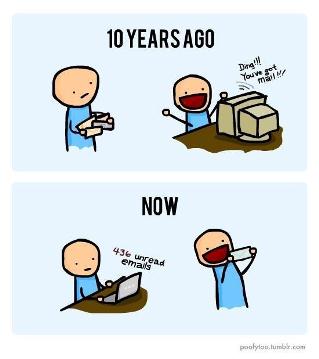I believe that the use of email has become too easy and has thus contributed to an overload of sometimes useless information.
Cast your mind back a decade or so ago. Wasn’t it somewhat thrilling to log onto your computer and hear AOL chime out “You’ve got mail” a few times a day? And, a few pieces of spam notwithstanding, the messages contained information you were actually interested in. Now think about today and the hundreds of times your phone/tablet/laptop pings, informing you of all the emails from distribution lists, applications, system processes, etc. you have next-to-no interest in and will delete immediately. How about the many pieces of email that contain your name on the CC field but you are not the primary recipient. Do you ignore it? And the 20 follow-up pieces of a conversation thread you did not want to be on in the first place?

I’ve just been out of the office for a few days with no access to my email. I was dreading logging onto my email and wading through the approximately 300 emails (it was a slow couple of days obviously!) that were waiting for me to at least peruse and decide whether to keep for deeper reading later or delete at first glance. After this time-consuming and soul-sucking endeavor, I was left with about 30 emails of various degrees of importance, and I then set about responding to those that required replies.
Let’s face it: We live in a 24x7x365 connected world and there is a level of expectation when it comes to email (i.e., I send you a message and I expect you to receive that message AND REPLY immediately whether you are actually available or not).
Additionally too few people bother to actually target their messages. Why should they when they can more easily add multiple people to the CC field and/or make use of the numerous distribution groups on offer? And, yes, most people today have access to other collaboration tools such as SharePoint or Jive, but that does not stop them mailing you that posted document as well, just in case . . . oh, and then of course the collaboration platform itself will also email you a notification message telling you that there is a document available!
The bottom line is that email has become so pervasive and easy to use that people use it even if they have access to other platforms that would actually allow them to communicate and collaborate more effectively.
You want that instant gratification of a reply? Then consider other forms of communication — for example, SMS texts, social networks such as Facebook or Twitter or (and especially) instant messaging, which also includes presence information so that you can tell whether the person you are to converse with is online, away, busy, etc. and is thus actually available to talk to you. (Whether they want to or not is another matter.) Want to collaborate as a group? Use SharePoint, Jive, Yammer or a similar platform. Just don’t send me another copy by email. Oh and one last thing: please never, ever send me a one-word reply such as “Thanks.” Your gratitude is implied.
The result of this information overload in a highly connected world is that it is starting to impinge on users’ personal time. There have already been instances of companies looking to alleviate the burden of this on their employees — see ATOS and Volkswagon — and some are starting to look at tools that can mine messaging data to look for communication patterns and use that data to identify subject matter experts, social networking, inefficiencies of current platforms that use data languishing in various communication platform datastores to provide meaningful business value. These tools could also be used to provide a Feedback Loop — personal information to a user regarding their actions which may lead to them changing those actions and thus lead them to better behavior.
Armed with this info, business could implement practices that would enhance collaboration and communication both internally and externally and could potentially reduce this Information overload.
Me? Personally, I would like to implement a cell-phone type of plan for corporate email: you can send a certain number of mails a month for free but are then charged for every one you send over that limit. I’m sure that would drastically affect the amount of email that I have to wade through on a daily basis!
Joel Blaiberg is a product manager for unified communications at Quest Software, now a part of Dell, where he develops product strategy for Quest’s reporting/analysis and troubleshooting/diagnostics messaging solutions. Prior to his current role, Joel spent many years as a senior systems engineer for a number of messaging administration, diagnostic, archiving and e-Discovery solutions.
